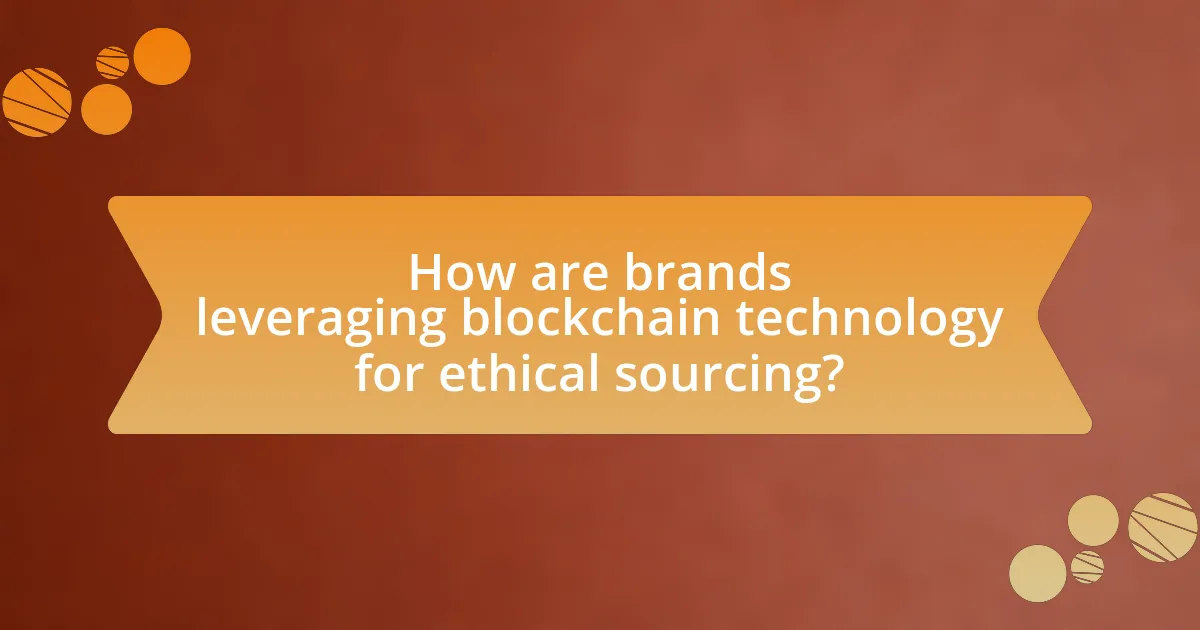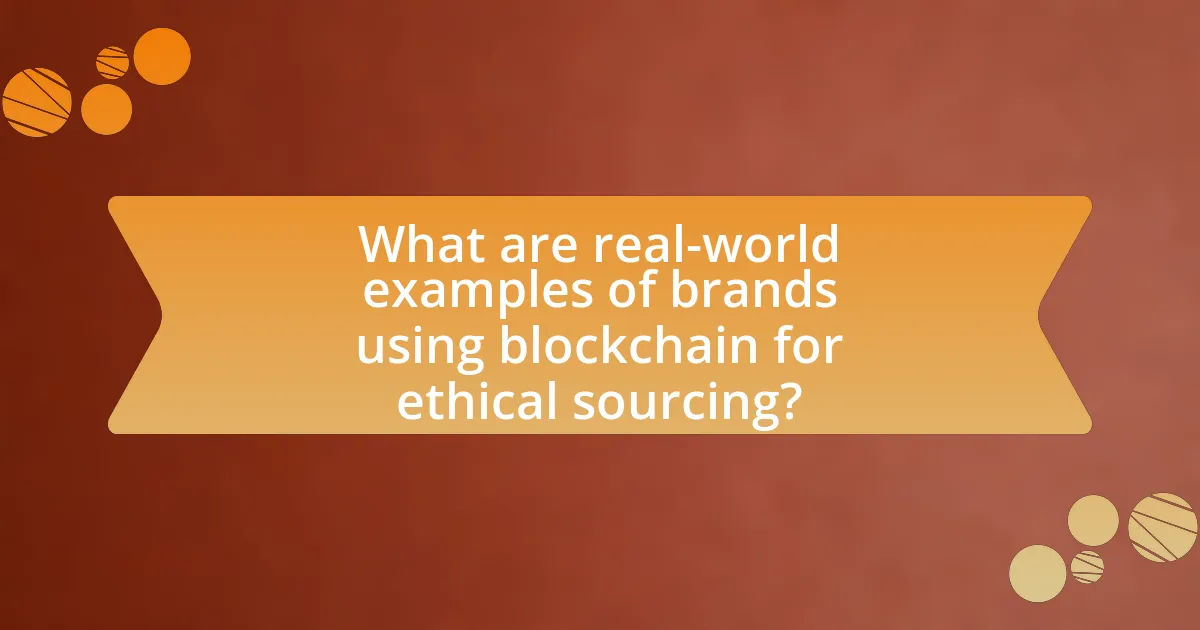The article focuses on how brands are utilizing blockchain technology to ensure ethical sourcing within their supply chains. It highlights the principles of ethical sourcing, including transparency, fair labor practices, and environmental sustainability, and explains how blockchain enhances traceability and accountability. The piece discusses real-world examples of companies like Walmart and De Beers that have successfully implemented blockchain for tracking product origins, thereby building consumer trust. Additionally, it addresses the challenges brands face in adopting blockchain, such as technological barriers and regulatory issues, while outlining best practices for effective integration and collaboration among stakeholders.

How are brands leveraging blockchain technology for ethical sourcing?
Brands are leveraging blockchain technology for ethical sourcing by creating transparent supply chains that allow consumers to trace the origin of products. This technology enables brands to record every transaction and movement of goods on an immutable ledger, ensuring that sourcing practices meet ethical standards. For instance, companies like Everledger use blockchain to verify the provenance of diamonds, ensuring they are conflict-free, while brands such as Provenance provide consumers with detailed information about the sourcing of materials in their products. This level of transparency not only builds consumer trust but also holds suppliers accountable, as all parties can access the same verified information.
What are the key principles of ethical sourcing?
The key principles of ethical sourcing include transparency, fair labor practices, environmental sustainability, and responsible sourcing of materials. Transparency ensures that supply chains are open and traceable, allowing consumers to understand the origins of products. Fair labor practices involve providing safe working conditions, fair wages, and respecting workers’ rights, which are essential for ethical treatment. Environmental sustainability focuses on minimizing ecological impact through responsible resource management and reducing waste. Responsible sourcing of materials emphasizes the importance of obtaining raw materials from suppliers who adhere to ethical standards, ensuring that products are not linked to exploitation or harm. These principles are critical for brands aiming to build trust and accountability in their supply chains, particularly as they leverage blockchain technology to enhance traceability and verification of ethical practices.
How does blockchain enhance transparency in supply chains?
Blockchain enhances transparency in supply chains by providing a decentralized and immutable ledger that records every transaction and movement of goods. This technology allows all participants in the supply chain, including manufacturers, suppliers, and consumers, to access real-time data regarding the origin, status, and journey of products. For instance, a study by IBM and the National Retail Federation found that 73% of consumers are willing to pay more for brands that offer complete transparency in their supply chains. This level of visibility helps to build trust among stakeholders and ensures accountability, as any discrepancies or fraudulent activities can be easily traced back to their source.
What role does traceability play in ethical sourcing?
Traceability is crucial in ethical sourcing as it allows brands to track the origin and journey of products throughout the supply chain. This transparency ensures that materials are sourced responsibly, adhering to ethical standards regarding labor practices, environmental impact, and sustainability. For instance, a study by the World Economic Forum highlights that 66% of consumers are willing to pay more for sustainable brands, emphasizing the importance of traceability in building consumer trust and accountability. By implementing blockchain technology, brands can provide immutable records of product origins, thereby enhancing traceability and reinforcing their commitment to ethical sourcing practices.
Why is blockchain considered a game-changer for brands?
Blockchain is considered a game-changer for brands because it enhances transparency and traceability in supply chains. This technology allows brands to securely record and verify every transaction, ensuring that products are sourced ethically and sustainably. For instance, companies like Walmart and Nestlé have implemented blockchain to track the origin of food products, significantly reducing the risk of fraud and improving consumer trust. According to a 2020 report by IBM, 73% of consumers are willing to pay a premium for brands that offer complete transparency in their supply chains, highlighting the growing demand for ethical sourcing facilitated by blockchain.
What advantages does blockchain offer over traditional sourcing methods?
Blockchain offers enhanced transparency, traceability, and security over traditional sourcing methods. By utilizing a decentralized ledger, blockchain allows all participants in the supply chain to access real-time data regarding the origin and journey of products. This transparency reduces the risk of fraud and ensures that ethical sourcing practices are followed, as every transaction is recorded and immutable. For instance, a study by Accenture found that 83% of consumers prefer brands that demonstrate transparency in their sourcing practices, highlighting the growing demand for accountability in supply chains.
How does blockchain help in combating fraud and unethical practices?
Blockchain helps in combating fraud and unethical practices by providing a transparent and immutable ledger that records all transactions. This transparency allows stakeholders to verify the authenticity of products and trace their origins, significantly reducing the risk of counterfeit goods. For instance, companies like De Beers use blockchain to track the provenance of diamonds, ensuring they are conflict-free and ethically sourced. The immutability of blockchain records means that once data is entered, it cannot be altered or deleted, which deters fraudulent activities. Additionally, smart contracts on blockchain can automate compliance checks, ensuring that all parties adhere to ethical standards throughout the supply chain.
What challenges do brands face when implementing blockchain for sourcing?
Brands face several challenges when implementing blockchain for sourcing, including high costs, technological complexity, and the need for industry-wide collaboration. The initial investment in blockchain technology can be substantial, with estimates suggesting that companies may spend millions on infrastructure and integration. Additionally, the complexity of blockchain systems requires specialized knowledge and skills, which can be a barrier for many organizations. Furthermore, effective implementation often necessitates collaboration across the supply chain, involving multiple stakeholders who may have differing interests and levels of technological readiness. These factors collectively hinder the widespread adoption of blockchain for ethical sourcing.
What are the technological barriers to blockchain adoption?
The technological barriers to blockchain adoption include scalability issues, interoperability challenges, and high energy consumption. Scalability refers to the difficulty in processing a large number of transactions quickly; for instance, Bitcoin can handle only about seven transactions per second, which is significantly lower than traditional payment systems like Visa that can process thousands. Interoperability challenges arise from the lack of standardization among different blockchain platforms, making it hard for them to communicate with each other. Additionally, high energy consumption is a concern, as the proof-of-work consensus mechanism used by many blockchains requires substantial computational power, leading to environmental concerns and increased operational costs. These barriers hinder widespread adoption and integration of blockchain technology in various sectors.
How do regulatory issues impact blockchain implementation?
Regulatory issues significantly impact blockchain implementation by creating compliance challenges that can hinder adoption. For instance, varying regulations across jurisdictions can lead to uncertainty for businesses looking to integrate blockchain technology, as they must navigate complex legal landscapes. A study by the World Economic Forum in 2020 highlighted that 77% of executives believe regulatory uncertainty is a barrier to blockchain adoption. Additionally, regulations concerning data privacy, such as the General Data Protection Regulation (GDPR) in Europe, can complicate the use of immutable ledgers, as they may conflict with the right to be forgotten. These regulatory hurdles can slow down the pace of innovation and limit the potential benefits of blockchain in ensuring ethical sourcing.
How can brands effectively integrate blockchain into their sourcing strategies?
Brands can effectively integrate blockchain into their sourcing strategies by utilizing the technology to enhance transparency and traceability in their supply chains. By implementing blockchain, brands can create an immutable ledger that records every transaction and movement of goods, allowing them to verify the origin and journey of their products. For instance, companies like Walmart and IBM have successfully used blockchain to track food products from farm to store, significantly reducing the time needed to trace the source of contamination from days to seconds. This level of transparency not only builds consumer trust but also ensures compliance with ethical sourcing standards, as stakeholders can easily access verified information about sourcing practices.
What steps should brands take to ensure successful blockchain implementation?
Brands should take the following steps to ensure successful blockchain implementation: first, they must clearly define their objectives for using blockchain technology, such as enhancing transparency in supply chains or improving traceability of products. Next, brands should conduct a thorough assessment of their current systems and processes to identify integration points for blockchain. Following this, they should select the appropriate blockchain platform that aligns with their goals, considering factors like scalability, security, and interoperability.
Additionally, brands need to engage stakeholders, including suppliers and customers, to ensure buy-in and collaboration throughout the implementation process. Training and educating employees on blockchain technology is also crucial to facilitate smooth adoption. Finally, brands should continuously monitor and evaluate the blockchain system’s performance, making adjustments as necessary to optimize its effectiveness.
These steps are supported by case studies, such as Walmart’s use of blockchain for tracking food products, which has demonstrated improved traceability and reduced response times during food safety incidents.
How can collaboration with stakeholders enhance blockchain effectiveness?
Collaboration with stakeholders enhances blockchain effectiveness by fostering trust, improving data accuracy, and facilitating shared governance. When brands, suppliers, and consumers work together, they can establish clear standards and protocols that ensure the integrity of the blockchain. For instance, a study by Accenture found that 83% of executives believe that collaboration across the supply chain can significantly improve transparency and traceability in blockchain applications. This collective effort leads to more reliable data input, which is crucial for maintaining the authenticity of transactions and ensuring ethical sourcing practices.

What are real-world examples of brands using blockchain for ethical sourcing?
Walmart and IBM are prominent examples of brands using blockchain for ethical sourcing. Walmart utilizes IBM’s Food Trust blockchain to trace the origin of food products, ensuring transparency and safety in its supply chain. This system allows Walmart to track the journey of produce from farm to store, significantly reducing the time needed to trace food sources from days to seconds. Additionally, De Beers employs blockchain technology through its Tracr platform to verify the provenance of diamonds, ensuring they are conflict-free and ethically sourced. This initiative enhances consumer trust by providing a transparent record of each diamond’s journey from mine to market.
Which brands have successfully implemented blockchain for ethical sourcing?
Walmart, De Beers, and IBM have successfully implemented blockchain for ethical sourcing. Walmart utilizes blockchain technology to trace the origin of food products, ensuring transparency and safety in its supply chain. De Beers employs blockchain to track the provenance of diamonds, verifying that they are conflict-free. IBM’s Food Trust platform enables various companies to share data on food sourcing, enhancing accountability and ethical practices. These implementations demonstrate the effectiveness of blockchain in promoting ethical sourcing across different industries.
What specific outcomes have these brands achieved?
Brands utilizing blockchain for ethical sourcing have achieved increased transparency in supply chains, leading to enhanced consumer trust. For instance, companies like Everledger have successfully tracked the provenance of diamonds, ensuring that they are conflict-free, which has resulted in a 20% increase in consumer confidence according to their reports. Additionally, Walmart has implemented blockchain to trace food products, reducing the time to trace produce from six days to mere seconds, significantly improving food safety and accountability. These outcomes demonstrate the effectiveness of blockchain in fostering ethical practices and consumer assurance in sourcing.
How do these case studies illustrate best practices in blockchain usage?
These case studies illustrate best practices in blockchain usage by demonstrating transparency, traceability, and accountability in supply chains. For instance, brands like Everledger utilize blockchain to track the provenance of diamonds, ensuring that they are conflict-free and ethically sourced. This application of blockchain technology allows consumers to verify the ethical claims made by brands, thereby enhancing trust. Additionally, companies such as Walmart have implemented blockchain to trace food products from farm to table, significantly reducing the time required to identify sources of contamination. This not only improves food safety but also showcases how blockchain can streamline operations and enhance consumer confidence in product integrity.
What lessons can be learned from these case studies?
The lessons learned from case studies on how brands are using blockchain to ensure ethical sourcing include the importance of transparency, traceability, and consumer trust. Transparency is crucial as it allows consumers to verify the origins of products, which enhances brand credibility. For instance, brands like Everledger utilize blockchain to track the provenance of diamonds, ensuring they are conflict-free, which directly addresses consumer concerns about ethical sourcing. Traceability enables brands to monitor their supply chains effectively, reducing the risk of unethical practices. A study by Accenture found that 73% of consumers are willing to pay more for sustainable products, highlighting the value of consumer trust in ethical sourcing initiatives. These case studies demonstrate that implementing blockchain technology can significantly improve ethical sourcing practices and foster stronger relationships with consumers.
What common strategies do successful brands share?
Successful brands commonly share strategies that emphasize transparency, consumer engagement, and sustainability. These brands utilize blockchain technology to provide verifiable information about their supply chains, ensuring ethical sourcing practices. For instance, companies like Everledger and Provenance leverage blockchain to track the origin of products, allowing consumers to verify the ethical standards of their purchases. This approach not only builds trust with consumers but also enhances brand loyalty, as evidenced by a 2021 study from IBM, which found that 70% of consumers are willing to pay a premium for brands that demonstrate transparency in their sourcing practices.
How can failures inform future blockchain initiatives?
Failures can inform future blockchain initiatives by providing critical insights into the limitations and challenges faced during implementation. For instance, the collapse of the Ethereum-based project DAO in 2016 highlighted vulnerabilities in smart contract security, leading to improved coding practices and security audits in subsequent projects. Additionally, the issues encountered by various supply chain blockchain initiatives, such as lack of interoperability and data accuracy, have prompted developers to create more robust frameworks that prioritize collaboration and standardization. These lessons learned from past failures enable organizations to refine their strategies, enhance technology, and ultimately foster more effective and secure blockchain applications in ethical sourcing.

What future trends can we expect in blockchain and ethical sourcing?
Future trends in blockchain and ethical sourcing include increased transparency, enhanced traceability, and the integration of artificial intelligence. Blockchain technology will enable brands to provide real-time data on the origin and journey of products, ensuring that sourcing practices are ethical and sustainable. For instance, a study by the World Economic Forum indicates that blockchain can reduce supply chain fraud by up to 50%, thereby fostering trust among consumers. Additionally, the use of smart contracts will automate compliance checks, ensuring that suppliers adhere to ethical standards. As consumer demand for ethically sourced products rises, brands will increasingly adopt blockchain solutions to meet these expectations and differentiate themselves in the market.
How is technology evolving to support ethical sourcing through blockchain?
Technology is evolving to support ethical sourcing through blockchain by enhancing transparency and traceability in supply chains. Blockchain technology enables the secure recording of transactions and the tracking of products from origin to consumer, ensuring that sourcing practices meet ethical standards. For instance, companies like IBM and Walmart have implemented blockchain solutions to trace the journey of food products, allowing consumers to verify the ethical sourcing of ingredients. This evolution is supported by the increasing adoption of decentralized ledger technology, which provides immutable records that can be audited, thereby reducing fraud and promoting accountability among suppliers.
What innovations are on the horizon for blockchain applications?
Innovations on the horizon for blockchain applications include enhanced interoperability, scalability solutions like sharding, and the integration of artificial intelligence for smarter contract execution. Enhanced interoperability will allow different blockchain networks to communicate seamlessly, facilitating broader adoption across industries. Scalability solutions, such as sharding, aim to increase transaction throughput, addressing current limitations in speed and efficiency. The integration of artificial intelligence can optimize smart contracts by enabling them to learn from data patterns, improving decision-making processes. These advancements are supported by ongoing research and development efforts in the blockchain community, indicating a strong trajectory toward more robust and versatile blockchain applications.
How might consumer expectations shape the future of blockchain in sourcing?
Consumer expectations will significantly shape the future of blockchain in sourcing by driving demand for transparency and traceability in supply chains. As consumers increasingly prioritize ethical sourcing and sustainability, brands will be compelled to adopt blockchain technology to provide verifiable proof of product origins and ethical practices. For instance, a 2021 survey by IBM found that 70% of consumers are willing to pay a premium for brands that demonstrate transparency in their supply chains. This growing expectation for accountability will lead companies to implement blockchain solutions that allow for real-time tracking of products, thereby enhancing consumer trust and loyalty.
What practical tips can brands follow to enhance their blockchain strategies?
Brands can enhance their blockchain strategies by focusing on transparency, collaboration, and education. Transparency involves providing clear and accessible information about the supply chain, which builds consumer trust and accountability. Collaboration with technology providers and industry partners can lead to more robust blockchain solutions that address specific challenges in ethical sourcing. Education for stakeholders, including employees and consumers, about the benefits and functionalities of blockchain technology fosters a better understanding and encourages adoption. These strategies are supported by case studies showing that brands implementing transparent blockchain systems have seen increased consumer loyalty and improved supply chain efficiency.
How can brands build consumer trust through blockchain transparency?
Brands can build consumer trust through blockchain transparency by providing verifiable and immutable records of their supply chain processes. This transparency allows consumers to trace the origin of products, ensuring that they are ethically sourced and produced. For instance, companies like Everledger utilize blockchain to track the provenance of diamonds, enabling consumers to confirm that their purchases are conflict-free. Research indicates that 73% of consumers are willing to pay more for products from brands that demonstrate transparency in their sourcing practices. By leveraging blockchain technology, brands can enhance accountability and foster a deeper connection with consumers, ultimately leading to increased trust and loyalty.
What are the best practices for maintaining blockchain systems in sourcing?
The best practices for maintaining blockchain systems in sourcing include ensuring data integrity, implementing robust security measures, and fostering collaboration among stakeholders. Data integrity is crucial; it can be achieved through regular audits and validation processes that confirm the accuracy of recorded transactions. Security measures, such as encryption and access controls, protect sensitive information from unauthorized access and cyber threats. Collaboration among stakeholders, including suppliers and consumers, enhances transparency and trust, which are essential for ethical sourcing. According to a report by Deloitte, companies that adopt these practices can significantly improve their supply chain transparency and accountability, leading to better ethical sourcing outcomes.



